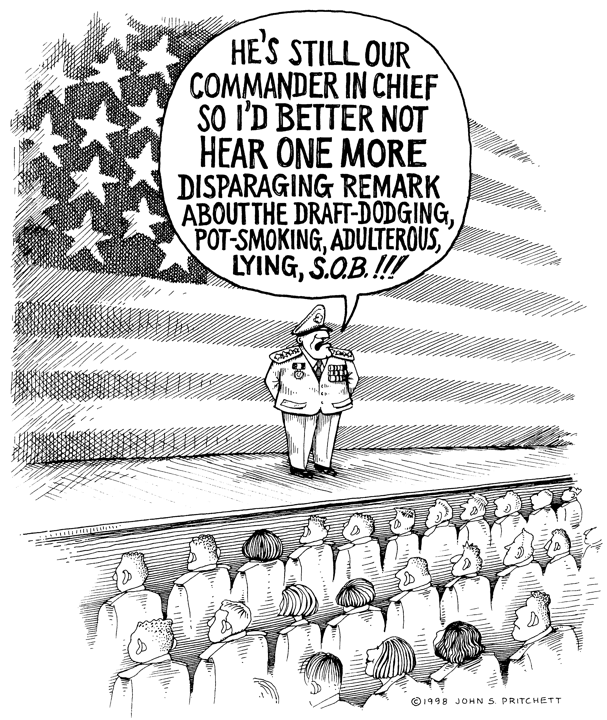As Bush sat in the co-pilot seat of a small four-seat Viking jet named Navy One for the occasion, he made a swashbuckling tailhook landing on the carrier Abraham Lincoln, going from 150 mph to a jolting stop when the plane hooked a wire strung across the deck. The President emerged wearing a bulky flight suit and a broad grin, a helmet tucked casually under his arm. He strutted across the deck, snapping salutes at the excited pilots and sailors gathering around him. "Yes, I flew it," said Bush, a former Air National Guard flier, when asked whether the pilot briefly handed over the controls during the flight from San Diego. "Really exciting. I miss flying." The "Top Gun" footage is guaranteed to be featured in next year's campaign ads showcasing his role as commander-in-chief. "The images were stunning, among the best of his administration," said one thrilled GOP ad man. "It was great political television." Payback time In his prime-time address on a vast deck crowded with cheering sailors lit by the setting sun, Bush said, "The United States and our allies have prevailed." More directly than ever before, Bush framed the Iraq war as payback for Al Qaeda's attacks on New York and Washington. "The Battle of Iraq is one victory in a war on terror that began on Sept. 11, 2001," he said, recalling "the last phone calls, the cold murder of children, the searches in the rubble." "The liberation of Iraq is a crucial advance in the campaign against terror," the President said. "This much is certain: No terrorist network will gain weapons of mass destruction from the Iraqi regime, because the regime is no more." Stripping Iraq of such weapons was the stated goal of the war, though none have been found. "We have begun the search for hidden chemical and biological weapons and already know of hundreds of sites that will be investigated," Bush said. He vowed that "we will leave behind a free Iraq," and in a pointed message to many leaders in the Arab world, including Syria and Iran, he added, "Everywhere that freedom stirs, let tyrants fear." He said the war on terror is not over, and that "we will continue to hunt down the enemy before he can strike." Bush did not formally declare victory. Legally, that would entail releasing all POWs and ending the hunt for Iraqi leaders, including Saddam Hussein, whose fate remains unknown. The President, however, is convinced Saddam was killed by U.S. air strikes on a bunker in western Baghdad on the first night of the war, White House sources told the Daily News yesterday. "He thinks he died on March 19," one well-placed source said of Bush. Still fighting While the war seemed glorious and far away aboard the Lincoln, on the ground it was different - especially in the tense town of Fallujah, 30 miles west of Baghdad. "This war is not over," said a lieutenant in the 3rd Armored Cavalry Regiment at Fallujah, whose troops were hunkered down inside two Bradley fighting vehicles while jittery sentries scanned rooftops for snipers. Earlier in the day, seven soldiers were slightly wounded when two grenades were lobbed into their compound - retaliation for two incidents in 48 hours in which U.S. troops opened fire on demonstrators, killing 14. American commanders said they shot in self-defense after being attacked. Iraqis said the troops shot unarmed civilians and vowed to drive them from the town. "All the people hate the American soldiers because they entered the mosque and searched the houses," said Taha Bdewe al-Alwane, Fallujah's mayor. "The people wanted the American Army to change their manners because it has not been good. It has made the people want revenge." Al-Alwane said he met with the battalion commander, Army Lt. Col. Toby Green, asking him to move the troops to the periphery of the city. Soldiers already had pulled out of several locations around town. Maj. Paul Green used the word "nervous" to describe his troops and said they are taking extra precautions. In Baghdad, at least four people were killed and 32 badly burned when an oil truck was hit - probably by bullets from Iraqis firing in the air in celebration of the return of electricity. In the chaos after the explosion, crowds started chanting anti-American slogans and wrestled with U.S. soldiers.
With Thomas M. DeFrank in Washington and Laura Winter in Fallujah, Iraq |



